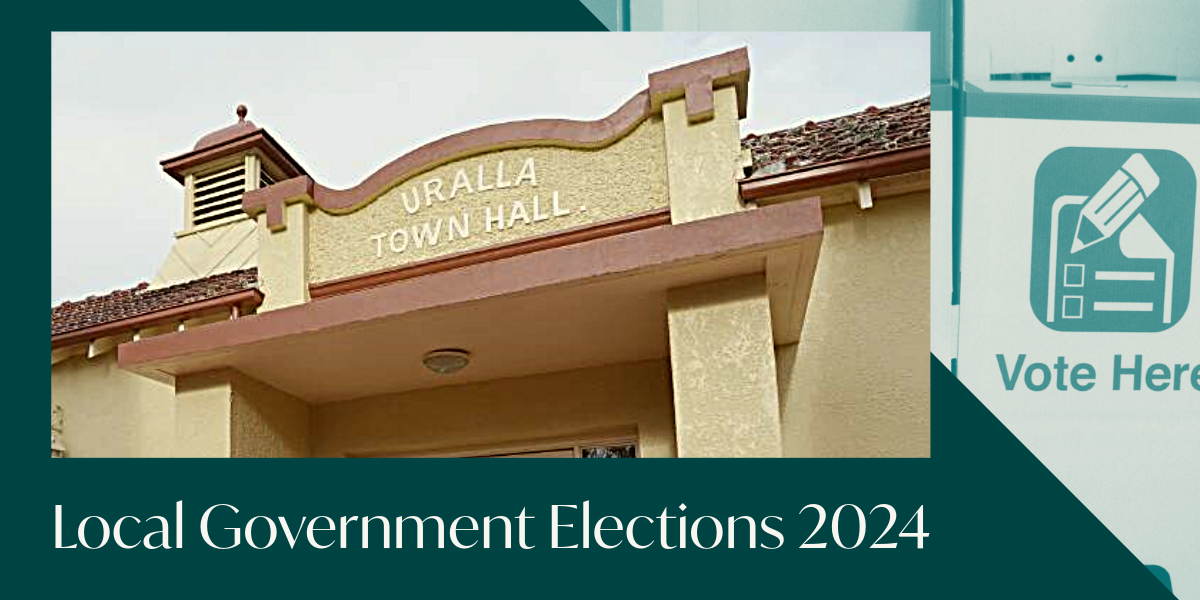The councillors have already been elected, but Uralla citizens still need to go the polling booth on Saturday 14 September to vote in a referendum.
The candidates that nominated for Uralla Council were exactly the number required – both wards got 4 candidate nominations, and only Robert Bell nominated for Mayor.
There will be a fairly significant change to the small village’s leadership however, with local powerhouse Tara Toomey as well as Tim Bower, Bob Crouch, and Bruce McMullen not recontesting their positions. David Mailler of Meralli Solar, former independent candidate for New England Adam Blakester, Rocky River P&C President and BAM Disability Services owner Jen Philp, and Kathrine Arnold are the new faces.
Uralla Council – Declared Elected
Mayor (uncontested)
- Robert Bell
Ward A (Uncontested)
- Adam Blakester
- David Mailler
- Tom O’Connor
- Lone Petrov
Ward B (Uncontested)
- Sarah Burrows
- Leanne Doran
- Kathrine Arnold
- Jen Philp
The NSW Electoral Commission declared the Uralla Council elected on the fifth of August.
However, Urallans will still need to go to the polling booth to vote on the referendum.
Do you want to vote on who the Mayor is?
There will be two questions on the referendum ballot paper. The first seeks to switch from directly elected mayor to a council elected mayor. The exact question wording is: Are you in favour of the Mayor being elected by the Councillors?
There are lots of pros and cons for having directly elected mayors. The pro’s are often that it gives more power to the people, directly elected mayors are usually more accountable for their actions, and they are often more active in advocating for their community.
It also brings a level of stability in leadership, as a directly elected mayor can’t be fired by council. A mayor elected by the community has a four year term, whereas the mayor elected by the councillors has a two year term, and then another councillor-only election is held.
However, a con is that a poorly performing or rogue mayor can’t be fired by council.
Former Uralla resident and leading expert in local government, Professor Joseph Drew, says there is good evidence that directly elected mayors are more expensive, because they tend to go off on their own.
“Research has found that Directly Elected Mayors can increase costs by up to 10 cent, on average, in all data, and that’s because the mayor often feels they’ve got a mandate and often act independently of the council.”
“So they have that mandate, and that results in extra spending, which isn’t a problem if there’s extra revenue to match it,” he said.
“You can also have mayor from one political persuasion, and the councillors all from another political persuasion, and they can have significant challenges working together.”
Mayor Robert Bell also indicated that the desire to have a council elected mayor was so they could be removed mid-term.
“The debate is between whether the community is best placed to elect their Mayor or the nine Councillors following the election.
“A number of Councillors had the view that they would like to be able to remove the Mayor after two years if they were not happy with their performance or a particular decision,” he said.
“The concern is that if an unsuitable candidate is the only nomination then the shire may not be well served.”
Mayor Bell said this referendum is to allow the community to reconsider the decision they made about ten years ago to switch to directly elected mayors, rather than based on any community pressure to return to the previous system.
Do you want to make sure that different parts of the area are represented on council?
The second question on the referendum ballot is a proposal to abolish the wards. Uralla council is divided into two wards, roughly north and south of town. There used to be three wards, it was changed to two, and now the question is to remove that division too. The exact question on the ballot is:
Are you in favour of removing the current ward system so that all electors vote for all Councillors that represent the Uralla Shire Council area?

Wards are more commonly used in very large city councils, but can also be used to ensure geographic representation in rural councils. Walcha abolished their wards a couple of years ago, and the only other council in the region to have wards is Tenterfield, which has five wards.
Professor Drew says the main concern with Uralla Shire Council has often been around ensuring Bundarra, at the other end of the LGA, is represented.
“That is a problem when you have no one at the table. It can be a problem in these rural areas, because villages are very different.”
By having a separate ward, it means there must be people on council that do not live in Uralla itself.
The problem with that is that if no one nominates, then Council will be short a few members, as a candidate in Ward A cannot take a seat that is allocated to Ward B. In very small population councils, like Uralla, it is often difficult to get enough candidates, as we see this year with no election required.
Voting in the referendum is compulsory. The result of the referencum will not be implemented until 2028. More information about the referendum is available from Council’s website.
Read all the way through to the end of the story? So did lots of other people. Advertise with New England Times to reach New England locals who are interested and engaged. Find out more here.

